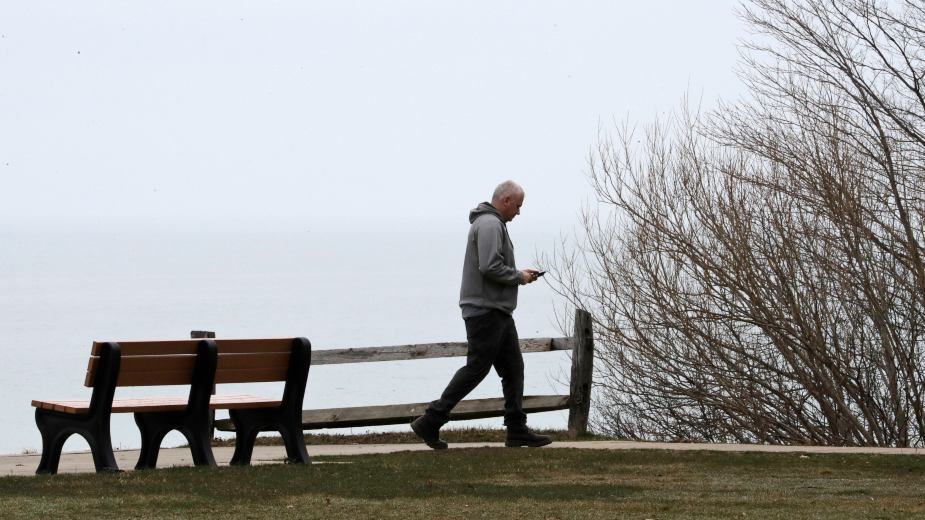State Officials Say Easter Too Early to End Stay-at-home
YOUNGSTOWN, Ohio — When pressed to respond to President Donald Trump’s goal to get workers back on the job by Easter, Gov. Mike DeWine said he and the president are aligned with wanting to get the economy moving again – but the state’s cases of COVID-19 aren’t expected to peak until around May 1.
“I think that the President and I are aligned. We want to get this over with as fast as we can. We want to get people back to work,” DeWine told reporters during his coronavirus update on Tuesday. “I would like to see the economy up and running in two weeks too.
“The truth is, protecting people and protecting the economy are not mutually exclusive. One depends on the other,” he added. “We save our economy by first saving lives. And we have to do it in that order.”
While DeWine shares Trump’s frustration with the impact of the coronavirus pandemic on the economy, the social distancing measures put into place are intended to minimize the impact to the health-care infrastructure in Ohio when the surge comes, “and we know it’s coming,” he said. If the hospitals are overwhelmed and people cannot get the care they need, or if health-care providers become sick and can’t care for their patients, “That would be truly destructive of our economy,” the governor said.
“The short-term consequences of slowing this economy down … will far outweigh the long-term economic meltdown from a deadly virus that is left unchecked. We cannot leave this unchecked,” he said. “Leaving the health-care system in shambles is not the way to grow the economy.”
The stay-at-home order is scheduled to expire on April 6, but DeWine has said his administration will reassess the order at that time, possibly extending it.
Locally, plans continue to deal with the approaching surge. Health officials have promoted the orders and messaging from DeWine and Dr. Amy Acton, director of the Ohio Department of Health, and they agree that the surge will not peak until late April to early May.
“Every suggestion I’ve seen, the peak of this isn’t until early May or the end of April,” affirms Dr. James Kravec, chief clinical officer for Mercy Health-Youngstown and medical director of Mahoning County Public Health. “Pushing the return to normalcy doesn’t make any sense to me.”
For the past month, Mercy has been busy planning for the surge, designing protocols in alignment with the CDD and ensuring it has plans established for both the ambulatory and inpatient settings, Kravec says. It has reduced elective surgeries, therapies, imaging and some lab work, he says.
Mercy’s COVID-19 task force has worked daily to develop “an agile response” to the pandemic, according to a statement from the health system. The system regularly monitors its supplies, including COVID-19 tests, PPE, ventilators and other resources.
“We are resourcing from around the globe and following Centers for Disease Control and Prevention guidelines on appropriate usage. In addition, we are working collaboratively with other health care and government agencies through this unprecedented event,” according to the statement.
Mahoning County leads the five-county region with 28 confirmed cases, followed by five in Trumbull County and three in Columbiana County, as well as two in Mercer County in Pennsylvania. As of this posting, Lawrence County has no confirmed cases.
Although Kravec has no information on why Mahoning County is leading the region, he attributes the higher case count to Mahoning County hospitals having “the most inpatient capacity” in the region, he says.
The numbers aren’t surprising, says Mahoning County Public Health Commissioner Ryan Tekac. He emphasizes that residents must take the governor’s stay-at-home order seriously and “be part of the solution, not part of the problem,” he says.
“We don’t have any rhyme or scientific reason why they’re raising,” Tekac says. “We know there’s community spread, which is why we’re asking individuals, as a community, to follow these orders. If they’re not an essential service, they need to stay home as much as possible.”
Tekac says residents and officials need to be “proactive and smart about this.” With the state’s stay-at-home order in effect as of 11:59 p.m. Monday, he says companies need to work with their legal departments to review the order and determine if they meet the criteria of being an essential service.
Local law enforcement and health departments are authorized to enforce the order.
“We will confer with the county prosecutor and law enforcement if necessary,” Tekac says.
Tekac and Kravec say it’s still too early to tell whether the governor’s orders are having an effect on the number of cases locally and across the state, but they have faith in the decisions.
“With everything I know about public health and the science of virus spread, Gov. DeWine and Dr. Acton are doing exactly what they should be doing,” Kravec says.
Pictured: A man walks along the shores of Lake Erie at Sims Park, Thursday, March 19, 2020, in Euclid, Ohio. (AP Photo/Tony Dejak)
Copyright 2024 The Business Journal, Youngstown, Ohio.



